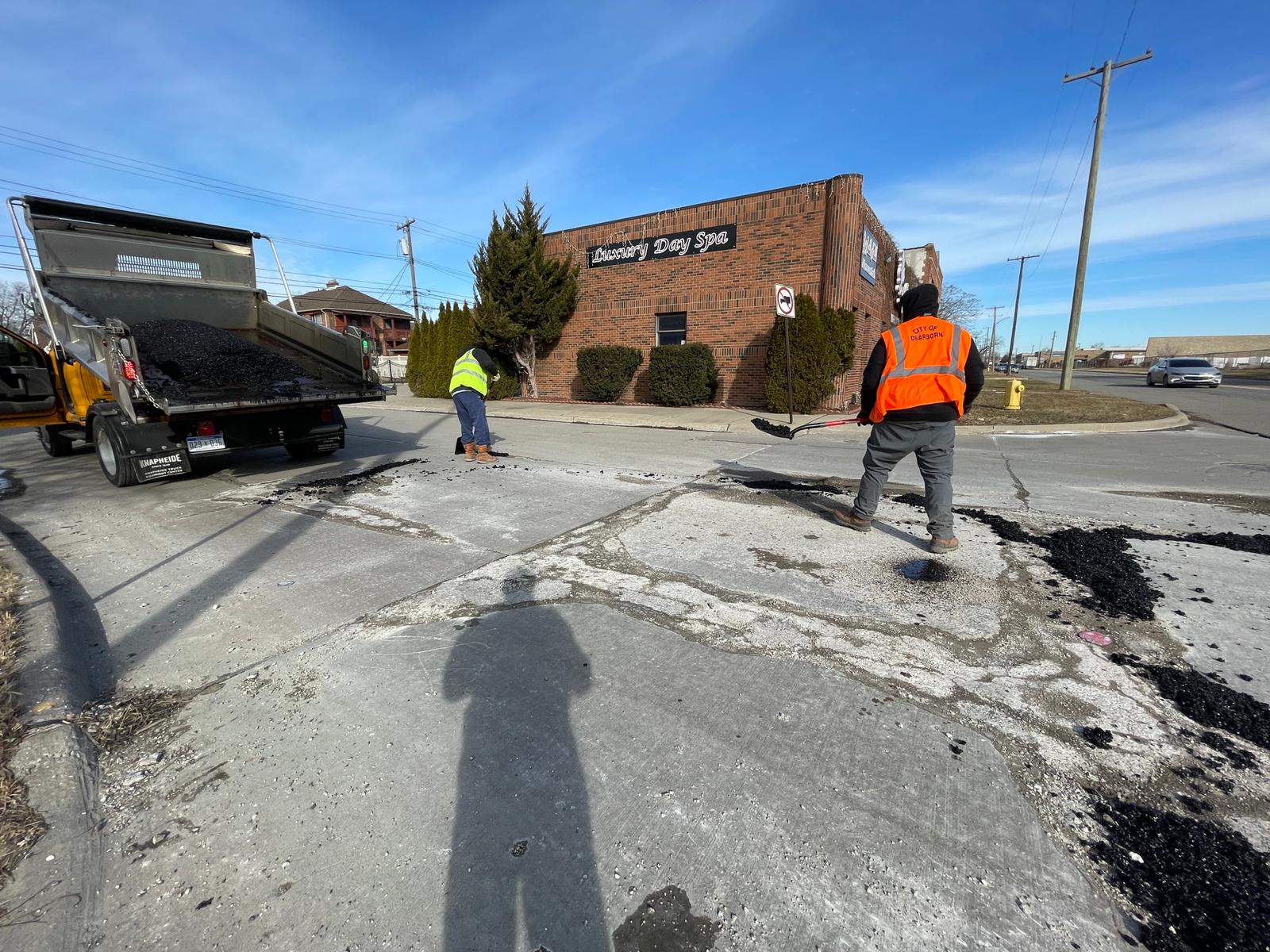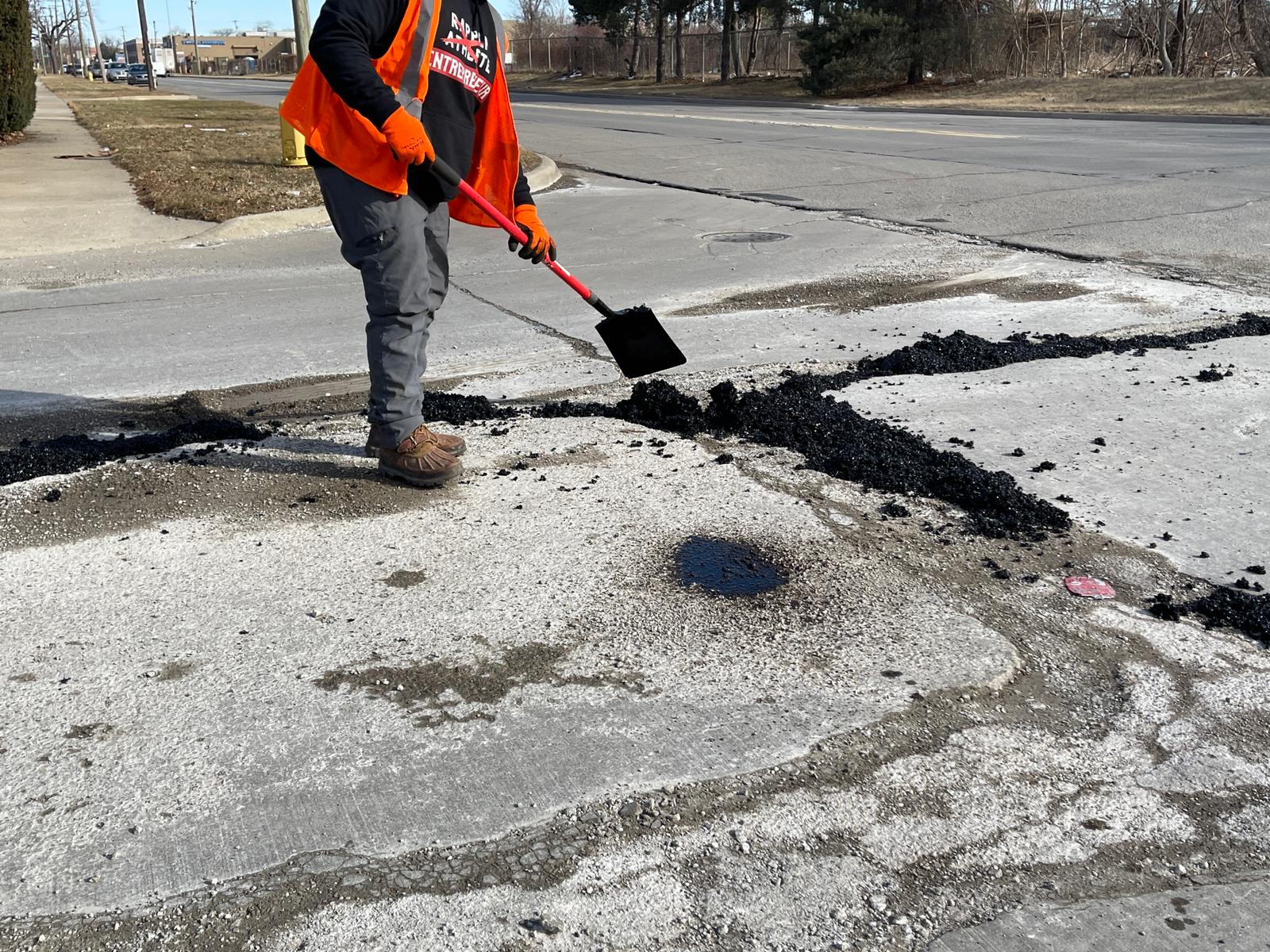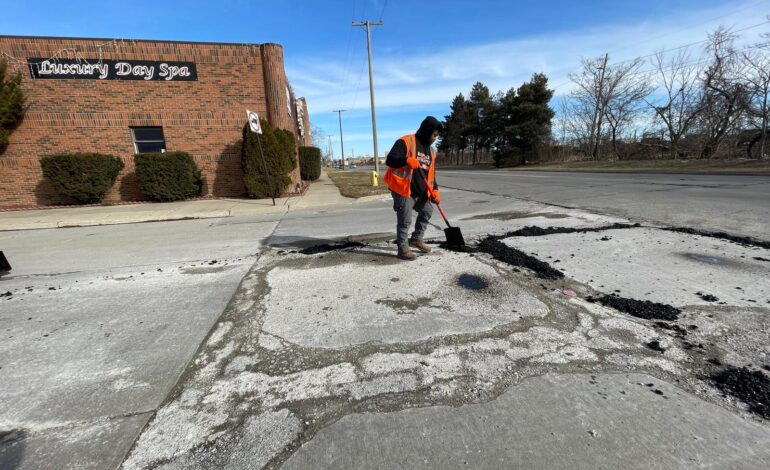WAYNE COUNTY — Pothole season continues in Metro Detroit and across the state, with drivers facing expensive repairs and even insurance claims from damaged wheels and suspensions.
Wayne County announced last week its highway division was increasing crews and work hours on roads it’s in charge of maintaining, expanding repair schedules to 10 hours per day/six days a week to directly address the areas with the greatest needs for road repair.
In Dearborn, many major roadways are maintained by the county, but the city’s Department of Public Works (DPW) also oversees nearly 300 miles of roads within city limits. This includes snow plowing, filling in potholes and other repairs.
Dearborn crews are out taking various shifts through the day and night to fill out cracks and potholes with fresh road material. But residents, in Dearborn and beyond, have demanded long-term solutions to the persistent problem, which is a state and federal funding issue.
Sam Hussein’s autobody shop Metrotech Automotive Group in Dearborn services vehicles from all over the state. He told The Arab American News that though potholes are a persistent problem in Michigan, this year is probably the worst he’s seen in a long time.
“The potholes this season are very bad,” Hussein said. “So we get a bunch of customers with bent wheels, front end suspension damage. They’re coming in back-to-back.”
Hussein said the problem isn’t just in Dearborn or Wayne County and extends out to Oakland and Macomb Counties as well.
With a newer vehicle, a single wheel can run upwards of a $1,000, with suspension work costing as much as $2,000 to $3,000. That’s damage to multiple points of the suspension, shocks, control arms and more.
Hussein said he would like to see the state get to road repairs as quickly as possible to prevent that kind of suspension damage.
“Since the state of Michigan doesn’t advance funds for vehicle repairs, people have to pay out of pocket or make insurance claims if the damage is extensive,” he said.

A city of Dearborn road maintenance crew fills out damaged segments of Miller Road, Thursday, March 3. Photo: Imad Mohamad/The Arab American News
The potholes this season are very bad. So we get a bunch of customers with bent wheels, front end suspension damage. They’re coming in back-to-back. — Sam Hussein, Metrotech Automotive Group in Dearborn
Wayne County says that in addition to routine maintenance, it responds to service requests regarding road condition complaints or notifications of hazardous road conditions.
“The County determines which areas have the most immediate needs based on which roads or sections of roadway pose or potentially pose an immediate safety hazard to the traveling public,” the County said to an email request by The Arab American News. “Areas of high traffic volume with moderate to extensive deterioration or latitudinal and longitudinal cracking are more prone to be negatively impacted by the frost and thaw cycle.”
Potholes occur year-round due to weather conditions, combined with aging infrastructure. In the spring and summer, potholes happen due to moisture penetrating the road surface through cracks and washing away the material just beneath. In the winter, this process is amplified by the expansion of the freezing moisture just beneath the road surface, creating larger voids and causing greater displacement (potholes) on the road surface as vehicles drive over it.
“The long-term solution involves increased federal and state funding to improve aging infrastructure to reduce the occurrences of potholes,” the County said.
In Wayne County, road crews were out on various stretches of major roads this week. This included some 22 miles of the Southfield Freeway between Telegraph and I-75 north and south, stretches of Cherry Hill, Van Born and more.

A city of Dearborn road maintenance worker fills out damaged segments of Miller Road, Thursday, March 3. Photo: Imad Mohamad/The Arab American News
This week, Governor Whitmer announced she signed an executive directive to direct the Michigan Department of Transportation (MDOT) to speed up pothole repairs on state trunkline highways.
The directive calls on MDOT to use all available resources, including overtime pay and contracted services, to expedite repairs of road surfaces, as well as to ensure the public can easily report the location of potholes or other issues.
This includes ensuring the public can easily communicate the location of potholes or other issues with road surfaces on state trunkline highways and that the state can assess and respond to these reports, disbursing money to local road agencies, funding that is appropriated by the Michigan legislature.
In Michigan, pavements typically are designed for a 20-year period of performance, although some states use 30- to 40-year periods, including some road segments in the state. The 20-year mark was adopted early in the state’s interstate program as the standard design life for federal-aid projects.
Building roads to last longer than 20 years requires higher-quality materials, including aggregates, asphalt and concrete, as well as improved road base and drainage systems, which means higher costs.
The American Society for Civil Engineers (ASCE) gave the country an overall grade of C- in its 2021 report card. The low grade came from persistent and unmanaged wear and tear on the nation’s roads — 43 percent of public roadways staying stagnantly in poor and mediocre conditions.
This year, Whitmer’s budget proposal has $6.3 billion to fix state and local roads, bridges, airports, transit and rail programs with the “right mix and material, so commuters have a smooth, reliable ride for decades to come.”
Bad infrastructure is a national problem, with the American Society for Civil Engineers (ASCE) giving the country an overall grade of C- in its 2021 report card. The low grade came from persistent and unmanaged wear and tear on the nation’s roads — 43 percent of public roadways staying stagnantly in poor and mediocre conditions — constant water main breaks and more.
The ASCE gave Michigan an overall D+ grade in 2018.
MDOT recommends that if a driver sees a pothole ahead and can’t safely steer to avoid it, it’s best to slow down, then release the brakes before they hit the pothole, lessening the impact while giving a car the best chance to absorb it. It’s best for wheels and suspension for a car to hit the pothole dead-on, so they can roll through the crack.
To report a pothole, call Wayne County’s 24-hour call center 888-ROAD-CREW (888-762-3273) or visit online at www.waynecounty.com.
Dearborn residents can make a call about a city road issue to the Highways Division of the DPW at 313-943-2107. A full list of city roads can be found at cityofdearborn.org/services/public-works.






Leave a Reply